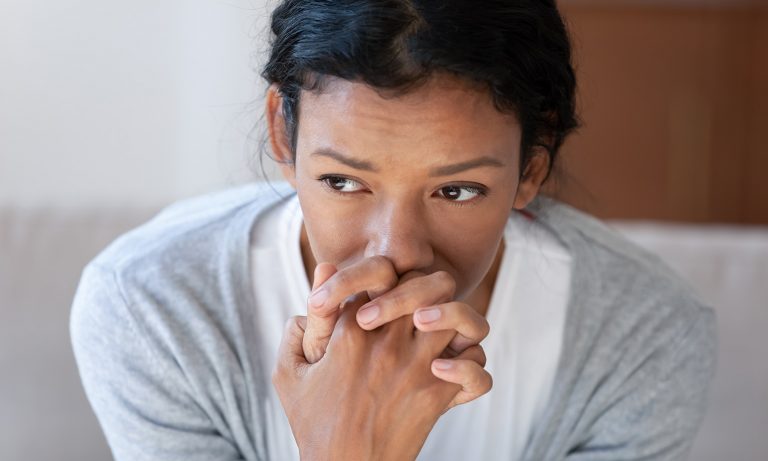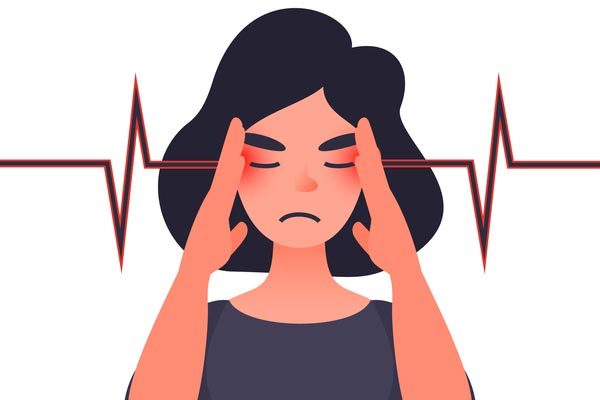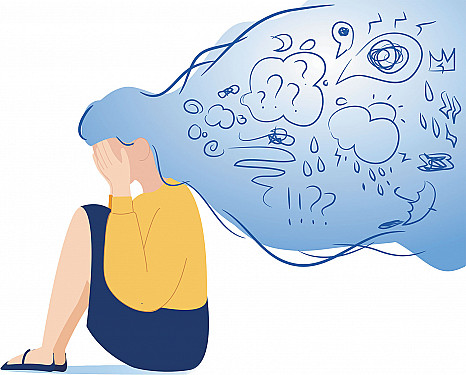Anxiety is a mental health condition that affects many people in different ways. For some, anxiety can be so debilitating that it interferes with their daily lives. One type of anxiety disorder is known as situational anxiety. This occurs when a person becomes anxious in specific situations, such as during a test or while speaking in public. If you are struggling with situational anxiety, don’t worry! There are many things you can do to overcome it. In this blog post, we will discuss what situational anxiety is, and we will provide tips for how to manage it effectively.
Contents
What Is Situational Anxiety?

Situational anxiety is the fear of specific situations or objects. It’s different from generalized anxiety disorder (GAD), which is a more chronic condition that causes anxiety and worries about many things. Situational anxiety is usually triggered by a specific event, such as public speaking, flying, or taking an exam. The anxiety is often disproportionate to the situation and may cause you to avoid the thing you’re afraid of.
Situational anxiety is normal and even helpful in some cases. It can motivate you to prepare for a presentation or study for an exam. But when the anxiety is excessive and interferes with your daily life, it may be time to seek treatment. When left untreated, situational anxiety can lead to GAD.
Situationally anxious? You’re not alone. Many people experience situational anxiety at some point in their lives. The key to managing it is to understand your triggers and find healthy coping mechanisms.
What Are The Symptoms of Situational Anxiety?

Situational anxiety can cause a variety of physical and psychological symptoms. These may include:
Physical Symptoms
There are many physical symptoms of anxiety, including:
Shortness of Breath
One of the most common physical symptoms of anxiety is shortness of breath. This can happen when your body goes into “fight-or-flight” mode, which is your body’s way of responding to a perceived threat. When this happens, your heart rate and blood pressure increase, and you may start to hyperventilate.
Heart Palpitations
Heart palpitations are another common physical symptom of anxiety. You may feel like your heart is racing or pounding, or that it’s fluttering in your chest. These sensations are usually harmless, but they can be frightening.
Sweating
Anxiety can also cause sweating. This usually happens along with a rapid heartbeat and may be triggered by fear or stress. Sweating also often occurs during hot flashes or night sweats.
Headaches
Anxiety can cause tension headaches, which are dull, aching headaches that feel like they’re squeezing or pressing on your head. Tension headaches are often caused by stress and muscle tension.
Stomach Problems
Anxiety can also cause stomach problems, such as nausea, diarrhea, and constipation. This is because anxiety can affect the way your digestive system works. Also, if you’re feeling anxious, you may not feel like eating, which can lead to stomach problems.
Fatigue
A lot of people with anxiety also experience fatigue. This is because anxiety can be taxing on your body and mind. It can make it hard to concentrate, and you may find yourself feeling more tired than usual.
Trembling or Shaking
Anxiety can also cause trembling or shaking. This is usually a result of your body’s “fight-or-flight” response kicking in. When you’re anxious, your body releases adrenaline and other stress hormones. These hormones can make you shake or tremble.
Psychological symptoms
In addition to physical symptoms, anxiety can also cause psychological symptoms, such as:
Fear
The main symptom of anxiety is fear. This may be a general feeling of anxiety or fear about something specific, such as public speaking or flying. Fear is a natural emotion that helps protect us from danger. But when it’s excessive and interferes with our daily lives, it becomes a problem.
Avoidance
Anxiety can also cause avoidance behavior. This means you may start avoiding the things that trigger your anxiety, such as flying or public speaking. Avoidance can make your anxiety worse and lead to other problems, such as social isolation.
Obsessive thinking
Anxiety can also cause obsessions, which are unwanted and intrusive thoughts that you can’t stop thinking about. Obsessions are often about things that make you anxious, such as germs or safety. You may try to control your obsessions by performing compulsions, which are repetitive beha
Paranoia
Paranoia is a type of anxiety that causes you to believe that others are out to get you or harm you in some way. Also, Paranoia can make you feel isolated and distrustful of others. Sometimes, paranoia can lead to delusions, which are false beliefs that you hold even when there’s evidence to the contrary.
What Risks Situational Anxiety?

Many different factors can contribute to situational anxiety. Some of the most common include:
Stress
One of the most common causes of anxiety is stress. Stress can be caused by a variety of things, such as work, school, or family problems. When you’re under a lot of stress, it can be hard to cope with everyday life. This can lead to anxiety. Stress also weakens your immune system, which can make you more susceptible to anxiety.
Genetics
Anxiety can also be caused by genetics. If you have a family history of anxiety, you’re more likely to develop it yourself. This is because anxiety can be passed down from generation to generation. Genetics also make some people more sensitive to anxiety-inducing situations.
Brain chemistry
Anxiety can also be caused by a chemical imbalance in the brain. This can be due to several things, such as a traumatic event or an underlying medical condition. A chemical imbalance can make it hard to regulate your emotions, which can lead to anxiety. Also, brain chemistry can make some people more prone to anxiety than others.
Medical conditions
Several medical conditions can cause anxiety. Some of these include:
Heart Disease
Heart disease is problems with the heart and its blood vessels. Also, Heart disease can cause chest pain, irregular heartbeat, and shortness of breath. All of these symptoms can also be caused by anxiety.
Cancer
Cancer is a disease that causes cells to grow out of control. Also, Cancer can cause a variety of symptoms, such as fatigue, pain, and weight loss. These symptoms can also be caused by anxiety.
Diabetes
Diabetes is a condition that causes high blood sugar levels. Also, Diabetes can cause symptoms such as increased thirst, hunger, and fatigue. These symptoms can also be caused by anxiety.
Asthma
Asthma is a condition that causes the narrowing of the airways. Also, Asthma can cause shortness of breath, wheezing, and coughing. These symptoms can also be caused by anxiety.
Anxiety disorders
Several anxiety disorders can cause anxiety. These include:
Generalized anxiety disorder (GAD)
GAD is a type of anxiety disorder that causes excessive worry and stress. People with GAD often have trouble sleeping and concentrating. They may also feel irritable and tense.
Panic disorder
Panic disorder is a type of anxiety disorder that causes panic attacks. Also, Panic attacks are episodes of intense fear that come on suddenly and without warning. During a panic attack, you may feel like you’re choking, having a heart attack, or losing control. Panic attacks can be very frightening.
Phobias
A phobia is a type of anxiety disorder that causes an intense fear of a specific object or situation. Common phobias include heights, snakes, and flying. People with phobias often go to great lengths to avoid the things they’re afraid of.
Post-traumatic stress disorder (PTSD)
PTSD is a type of anxiety disorder that can develop after a traumatic event. Traumatic events include things like war, natural disasters, car accidents, and sexual assault. People with PTSD often have flashbacks and nightmares. They may also feel irritable, jumpy, and on edge.
Situations That May Cause Situational Anxiety

Many different situations can trigger anxiety. Some common triggers include:
Public Speaking
One of the most common triggers for anxiety is public speaking. This is because you may feel like you’re being judged or evaluated by others. You may also worry that you’ll make a mistake or say something embarrassing.
Test Taking
Another common trigger for anxiety is test taking. This is because you may feel like your whole future depends on the results of the test. You may also worry that you’ll fail or do poorly.
Interviews
Interviews can also be a trigger for anxiety. This is because you may feel like you’re being put under a microscope. You may also worry that you won’t get the job or that you’ll say something wrong.
First Dates
First dates can also be a trigger for anxiety. This is because you may feel like you’re being judged on your looks and personality. You may also worry that you won’t have anything in common with the other person.
Job Interviews
Job interviews can be a trigger for anxiety because you want to make a good impression. You may also worry that you’re not qualified for the job or that you’ll say something wrong.
Performance Reviews
Performance reviews can also be a trigger for anxiety. This is because you may feel like your job is on the line. You may also worry that you’re not doing well enough or that your boss will find fault with your work.
Treatment of Situational Anxiety
When it comes to treatment, situational anxiety is something that can be worked on and improved with the help of a therapist, counselor, or other mental health professional. Some of these treatment options are:
Medications

One of the most common treatments for anxiety is medication. There are many different types of medications that can be used to treat anxiety, and the type that is best for you will depend on your specific situation.
Some of these medications that are commonly used to treat anxiety include:
Selective serotonin reuptake inhibitors (SSRIs): These medications include drugs like fluoxetine (Prozac), sertraline (Zoloft), and paroxetine (Paxil). They work by increasing levels of serotonin in the brain, which can help to improve mood and decrease anxiety.
Serotonin-norepinephrine reuptake inhibitors (SNRIs): These antidepressants affect two neurotransmitters, serotonin, and norepinephrine, that are involved in pain perception. Examples of SNRIs include duloxetine (Cymbalta) and venlafaxine (Effexor XR).
Benzodiazepines: Benzodiazepine is a type of sedative that may be used as a short-term treatment for generalized anxiety disorder. Benzodiazepines work by slowing down the central nervous system. Examples of benzodiazepines include alprazolam (Xanax) and diazepam (Valium).
Tricyclic antidepressants: These medications were developed to treat depression but are also effective for anxiety. Tricyclics affect the neurotransmitters norepinephrine and serotonin. Examples of tricyclics include amitriptyline and imipramine (Tofranil).
Monoamine oxidase inhibitors (MAOIs): MAOIs were developed to treat depression but may also be effective for some people with anxiety. MAOIs prevent the breakdown of monoamine neurotransmitters, including serotonin, norepinephrine, and dopamine. Examples of MAOIs include tranylcypromine (Parnate) and phenelzine (Nardil).
Beta-blockers: Beta-blockers can help control some of the physical symptoms of anxiety, such as a rapid heart rate and trembling hands. Examples of beta-blockers include propranolol (Inderal) and atenolol (Tenormin).
Therapy

Another common treatment for anxiety is therapy. Many different types of therapy can be effective for treating anxiety, and the type that is best for you will depend on your specific situation. Some of these therapy options include:
Cognitive behavioral therapy (CBT): CBT is a type of therapy that focuses on changing negative thoughts and behaviors. CBT can be effective in treating many different types of anxiety disorders, including generalized anxiety disorder, social anxiety disorder, and panic disorder.
Exposure therapy: Exposure therapy is a type of CBT that involves gradually exposing yourself to the things that you are afraid of. This can help you to learn to cope with your fears and decrease your anxiety.
Acceptance and commitment therapy (ACT): ACT is a type of therapy that focuses on accepting the things that you cannot change and committing to change the things that you can. ACT can be helpful for people with anxiety who have difficulty accepting their condition.
Dialectical behavior therapy (DBT): DBT is a type of therapy that focuses on helping you to cope with strong emotions. DBT can be helpful for people with anxiety who have difficulty regulating their emotions.
Eye movement desensitization and reprocessing (EMDR): EMDR is a type of therapy that uses eye movements to help you process and heal from trauma. EMDR can be helpful for people with anxiety who have experienced trauma or who have post-traumatic stress disorder (PTSD).
Self-Help Strategies
In addition to therapy and medication, many self-help strategies can be effective in treating anxiety. Some of these self-help strategies include:
Relaxation techniques: Relaxation techniques, such as yoga, meditation, and deep breathing, can help to reduce stress and anxiety. Some of these techniques can be learned on your own, while others may require the help of a trained therapist.
Exercise: Exercise can help to improve your mood and reduce stress and anxiety. It is important to find an exercise routine that you enjoy and that fits into your lifestyle.
Healthy diet: Eating a healthy diet can help to improve your mood and reduce stress and anxiety. Eating plenty of fruits, vegetables, whole grains, and lean protein can help to keep your mind and body healthy.
Sleep: Getting enough sleep is important for reducing stress and anxiety. Make sure to get at least 7-8 hours of sleep every night.
Limit alcohol and caffeine: Alcohol and caffeine can increase anxiety levels. limit your intake of these substances to reduce your anxiety.
Connect with others: Connecting with friends, family, or a support group can help to reduce stress and anxiety. Talking about your experiences can help you to feel supported and understood.
Anxiety can be a difficult condition to live with, but there are many effective treatments available. If you are struggling with anxiety, talk to your doctor or a mental health professional to find the best treatment for you. With the right treatment, you can overcome anxiety and live a healthy and happy life.
Conclusion
Situational anxiety can be described as feeling anxious in response to a specific situation. This type of anxiety is normal and experienced by everyone at some point in their lives. While it may not always be possible to avoid the situations that trigger anxiety, some things can be done to cope with and manage it. Some coping mechanisms include deep breathing exercises, positive self-talk, and visualization. If situational anxiety is proving to be particularly debilitating or disruptive, it may be necessary to seek out professional help. With the proper tools and support, it is possible to overcome situational anxiety and live a full and happy life.
Hope this article was of help to you! If you are suffering from mental health disorders, you may seek help from Therapy Mantra. We have a team of highly trained and experienced therapists who can provide you with the tools and skills necessary for overcoming mental health disorders. Contact us today to schedule an online therapy or download our free Android or iOS app for more information.


